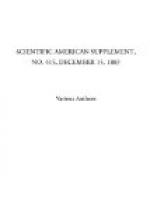Intemperance is an inexhaustible source of the development and increase of insanity. It demands our undivided attention, not only on account of its existing relation, but particularly because intemperance, among all the factors which aid in the increase of insanity, can best be diminished, and its influence weakened, through the will of the single individual, as well as of society as a whole. The relation between intemperance and insanity is so definite and clear, that it is not necessary to adduce proofs of this fact. I will not refer to the writings of the older authors, such as Rush, in America; Hutchison, Macnish, Carpenter, and others, in England; Huss and Dahl, in Sweden; Ramaer, in Holland; Esquirol, Pinel Brierre de Boismont, Morel, and others, in France; Flemming, Jameson, Roller, Griesinger, and others, in Germany. I could name a much larger number of the greatest modern authorities on insanity, who are all unanimous in their opinion that the increase of intemperance (alcoholism) produces a corresponding increase of insanity. Of especial interest is this fact in those countries in which the consumption of concentrated alcohol, and particularly in the form of whiskies distilled from potatoes and corn, has only in later years become general. Thus Lunier has shown the number of alcoholic insane increased by ten per cent. in those departments in which more whisky and less wine is consumed.
In Italy a similar result has been reached by investigation; and in that country (according to Kanti, Sormani, Vesay, Rareri, Castiglione, Ferri, and others) the frequency of insanity caused by the abuse of alcohol stands in an unmistakable relation to the consumption of alcohol in certain provinces of Italy.




